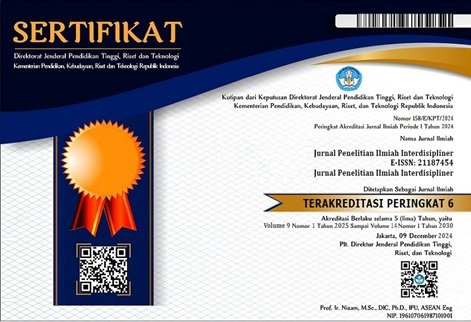PENGARUH ETIKA BISNIS ISLAM DAN LOKASI TERHADAP KESEJAHTERAAN PEDAGANG DI PASAR TRADISIONAL
Kata Kunci:
Etika Bisnis Islam, Lokasi, Kesejahteraan, Pedagang, Pasar TradisionalAbstrak
Pasar tradisional merupakan salah satu pilar ekonomi yang memiliki peran penting dalam perekonomian Indonesia. Keberadaan pasar tradisional tidak hanya menyediakan kebutuhan sehari-hari masyarakat, tetapi juga menjadi sarana bagi banyak pedagang untuk mencari mata pencaharian. Penelitian ini bertujuan unutk mengetahui pengaruh etika bisnis islam dan lokasi terhadap kesejahteraan pedagang di pasar tradisional. Penelitian ini menggunakan metode penelitian kuantitatif. Populasi dari penelitian ini adalah pedagang di pasar tradisional yang berada di kecamatan Mojosari. Peneliti menyebarkan 96 kuesioner yang disebarkan secara online melalui media google form. Teknik analisis yang digunakan adalah regresi linear berganda. Berdasarkan hasil perhitungan uji t dapat diketahui bahwa etika bisnis Islam (X1) berpengaruh positif signifikan terhadap kesejahteraan pedagang (Y), ini dibuktikan dengan uji t yang menunjukkan nilai t-hitung sebesar 11,989 dengan signifikansi 0,000 sehingga dinyatakan hipotesis 1 diterima. Selanjutnya, variabel lokasi (X2) dinyatakan tidak berpengaruh signifikan terhadap kesejahteraan pedagang (Y), dengan nilai t-hitung sebesar 0,925 dan signifikansi sebesar 0,357 sehingga hipotesis 2 tidak dapat diterima. Sedangkan berdasarkan perhitungan nilai Koefisien Determinasi (R2) nilai hubungan (R) yaitu sebesar 0,790. Dari output tersebut diperoleh koefisien determinasi (R Square) yaitu sebesar 0,624 yang mengandung pengertian bahwa pengaruh etika bisnis Islam dan lokasi terhadap kesejahteraan pedagang sebesar 62,4%. Sisanya sebesar 37,6% dipengaruhi oleh faktor lain selain X1 dan X2 yang tidak masuk dalam model penelitian ini.
Traditional markets are one of the economic pillars that have an important role in the Indonesian economy. The existence of traditional markets not only provides the daily needs of the community, but also becomes a means for many traders to make a living. This research aims to find out the influence of Islamic business ethics and location on the welfare of traders in traditional markets.
This study uses a quantitative research method. The population of this study is traders in traditional markets in Mojosari district. The researcher distributed 96 questionnaires that were distributed online through google form media. The analysis technique used is multiple linear regression.
Based on the results of the t-test calculation, it can be seen that Islamic business ethics (X1) has a significant positive effect on the welfare of traders (Y), this is evidenced by the t-test which shows a t-count value of 11.989 with a significance of 0.000 so that hypothesis 1 is declared accepted. Furthermore, the location variable (X2) was declared not to have a significant effect on the welfare of traders (Y), with a t-calculation value of 0.925 and a significance of 0.357 so that hypothesis 2 could not be accepted. Meanwhile, based on the calculation of the Coefficient of Determination (R2) value, the relationship value (R) is 0.790. From this output, the determination coefficient (R Square) was obtained which was 0.624 which contains the understanding that the influence of Islamic business ethics and location on the welfare of traders is 62.4%. The remaining 37.6% was influenced by other factors other than X1 and X2 that were not included in this research model.





